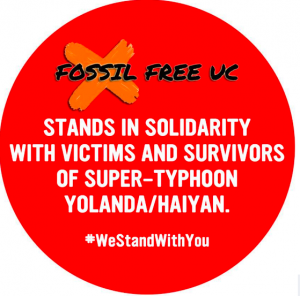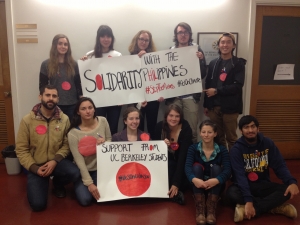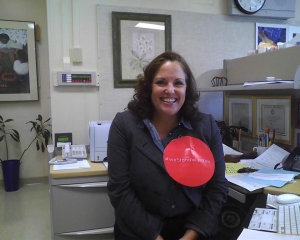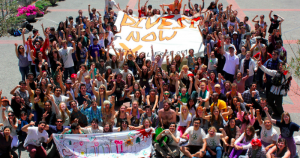By: Katie Hoffman, with contributions from Emily Williams and Ophir Bruck
Just days after super-typhoon Haiyan devastated the Philippines, nine students addressed the Regents of the University of California for the fifth time demanding UC officials, particularly newly appointed president Janet Napolitano, take swift and meaningful action to address the climate crisis by divesting the UC’s endowment from the 194 publicly traded coal, oil, and gas companies fueling it. Today, UC students are joining with youth around the world in a day of solidarity with the people of the Philippines and their lead UN climate negotiator, Naderev Saño, who is on his 11th day hunger-striking for the duration of the 19th UN climate talks or until meaningful international action is taken. Moved to action by Naderev’s fast and the devastation in the Philippines, students are fasting and holding vigils across California and the nation today to highlight the connections between climate change, inequality, and the need for bold institutional leadership.
For the Fossil Free UC campaign, the statewide #WeStandWithYou day of action comes just after a key meeting with high ranking financial administrators within the UC Office of the President (UCOP) in Oakland Tuesday, November 19. At their second meeting with UCOP, student representatives were joined by shareholder advocacy and socially responsible investment experts from As You Sow and Trillium Asset Management. Both off campus organizations worked alongside students in the meeting, lending their expertise to Fossil Free UC’s call for the Regents to swiftly adopt a five year plan to stop investing in new fossil fuel assets, drop all existing assets in the industry, and roll out proactive climate investment strategies over the next five years.
In the 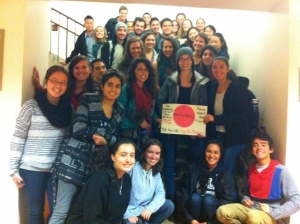 meeting, the students and their allies argued there is no statistical evidence that illustrates investing away from fossil fuels into various sustainable solutions will hurt returns on investments for shareholders. In fact, as articles by HSBC Global and the Carbon Tracker Initiative have suggested, the risks of remaining invested in fossil fuels might be greater than what traditional financial experts are factoring into their current models and investment strategies. Since 2012 there has been a flood of publications addressing the finite nature of the carbon industries’ business model and the need to set limits on fossil fuel extraction so that 80% of their proven carbon reserves remain underground. This mounting evidence suggests that if the current overvaluation of fossil fuel stocks proves correct, the potential economic tidal waves could parallel or exceed those during the sub-prime crisis that hit in 2008.
meeting, the students and their allies argued there is no statistical evidence that illustrates investing away from fossil fuels into various sustainable solutions will hurt returns on investments for shareholders. In fact, as articles by HSBC Global and the Carbon Tracker Initiative have suggested, the risks of remaining invested in fossil fuels might be greater than what traditional financial experts are factoring into their current models and investment strategies. Since 2012 there has been a flood of publications addressing the finite nature of the carbon industries’ business model and the need to set limits on fossil fuel extraction so that 80% of their proven carbon reserves remain underground. This mounting evidence suggests that if the current overvaluation of fossil fuel stocks proves correct, the potential economic tidal waves could parallel or exceed those during the sub-prime crisis that hit in 2008.
While UC officials showed elements of sympathy toward Fossil Free UC in the meeting last Tuesday, students were told ultimately that no decisions about UC investment policies could be made until the administration hires a new Chief Investment Officer in January 2014. As evidenced by costly and tragic disasters from Superstorm Sandy to Typhoon Haiyan, the devastation wrought by climate change will not wait for inefficient negotiations to address much needed investment in mitigation and adaptation efforts. As the most prestigious public academic institution in the world, the University has both an opportunity and an obligation to take bold and meaningful action on climate change by removing its implicit support from the companies fueling it and reallocating funds towards local and global climate solutions. As such, Fossil Free UC will continue pressing the administration to expedite the process of divestment, with the goal of adopting a fossil free investment policy by the end of the academic year.
In an ideal world, student led campaigns targeting portfolios would not exist, nor would fasts to honor preventable deaths and unnecessary destruction. Haiyan is a tragic and timely reminder that we do not live in an ideal world when it comes to addressing and rapidly correcting the systematic destruction of our only home. Grassroots campaigns like Fossil Free grew in response to the ineffective state of international and national policy making, which is utterly skewed in service of international climate change profiteers, like the extractive industries and the nations most reliant on them. According to recent UCSB graduate Emily Williams who attended the 19th Conference of the Parties in Warsaw, the conference “is not going to produce the binding treaties we need because of the disproportionate influence of those industries with a vested interest in preserving the status quo.” She continued, “it’s up to us, as individuals and institutions, to really spur the change we want to see; we need to stop the corporate influence and free ourselves from the industry whose business model is at the expense of our species’ survival.” Divestment campaigns, particularly at public institutions like those in California, are a critical front in the larger struggle to spur the change needed to weather the coming ecological and economic storms.
While many question the tactic of divestment given the complex nature of the climate problem, the coordinated efforts of youth across the globe today in solidarity with the victims of Haiyan illustrate just how powerful youth climate networks have gotten. Fossil Free UC joins more than 300 student-led campaigns across the country, some of which have seen recent divestment victories like De Anza Community College and San Francisco State University. Many campaigns, like those at Brown and Harvard, have recently come up against what may seem like insurmountable hurdles with administrators who refuse to adopt fossil free investment policies. Ultimately however, like the people of the Philippines and all others facing the devastating causes and effects of climate degradation, the Fossil Free campaign and climate justice movement will only adapt and grow more powerful.
Those with pictures from the #WeStandWithYou day of Action can send them to Emily(at)sustainabilitycoalition.org
We also ask that you please consider donating to relief efforts: http://nafconusa.org/

